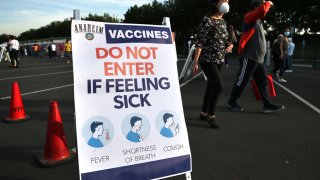
What to Know
- To get to the red tier, the county has to have a case rate per 100,000 of 4 to 7, positivity rate of 5 to 8% and a Health Equity Quartile rate of 5.3 to 8%. These metrics are updated every Tuesday.
- Hospitalizations continued a downward trend, dropping from 577 Sunday to 556 Monday.
- There has also been a dip in demand for COVID-19 testing, Orange County CEO Frank Kim said.
Orange County continued its march from purple to the less restrictive red tier, due to decreasing coronavirus cases, which will allow for the reopening more businesses, as 253 new COVID-19 cases and logged 38 more deaths were reported.
The cumulative case count stands at 244,885 and the death toll rose to 3,848.
Hospitalizations continued a downward trend, dropping from 577 Sunday to 556 Monday, with the number of coronavirus patients in intensive care dropping from 190 to 179, according to the Orange County Health Care Agency.
Get top local stories in Southern California delivered to you every morning. >Sign up for NBC LA's News Headlines newsletter.
The county has 15.9% of its ICU beds available and 59% of its ventilators.
The daily test positivity rate was 5.4% on Monday, the equity rate for minority residents in hot spots, was at 7%, and the case rate per 100,000 was at 11.7, Orange County CEO Frank Kim said.
"Those are good numbers,'' Kim told City News Service. "That would get us access to a lot of sports that a lot of the community wants... We're not at the red tier yet, but we're going down about one point a day.''
There has also been a dip in demand for COVID-19 testing, Kim said.
"There's been a reduction in the amount of people seeking testing,'' Kim said. "It's not that we're testing at a low rate, but if you see a decline in cases and testing that tells you there aren't a lot of cases because they move in parallel.''
Of the 38 deaths reported Monday, eight were skilled nursing facility residents and three were assisted living facility residents, hiking the death tolls among those populations to 948 and 431, respectively.
The death reports are staggered because they come from a variety of sources and are not always logged immediately.
January was the deadliest month so far in the pandemic with a death toll now at 1,195. That beat the previous record from December, which now has a death toll of 879.
So far, 70 deaths have been logged in February.
Plan Your Vaccine: How and where to get vaccinated.
The deadliest day during the pandemic was Jan. 5 when 66 people died.
The second highest was Jan. 3 when 64 people died. Nearly 54% of the county's deaths during the pandemic happened in December and January.
The county's test positivity rate was 7.8% and the adjusted case rate per 100,000 was 20.7. The Health Equity Quartile Positivity Rate, which reflects the rates in lower-income minority neighborhood hot spots, was at 10.7%.
To get to the red tier, the county has to have a case rate per 100,000 of 4 to 7, positivity rate of 5 to 8% and a Health Equity Quartile rate of 5.3 to 8%. These metrics are updated every Tuesday.
The county reported 5,125 tests, raising the cumulative to 2,967,884.
Officials were still waiting for word on restocking vaccines as winter storms in the East have blocked delivery of doses.
The only vaccine distribution point open on Monday was the one at Soka University in Aliso Viejo.
"We did not get any vaccine deliveries over the weekend,'' Kim said. "Nor did we get any as of 11 this morning.''
County officials "were told we would get more vaccine this week,'' Kim said. "It is today or tomorrow? We're hoping it is today or tomorrow.''
When Could I Get the Vaccine?
Answer the questions to calculate your risk profile and see where you fall in your county's and state's vaccine lineup. This estimate is based on a combination of vaccine rollout recommendations from the CDC and the National Academies of Sciences, Engineering, and Medicine.
For a more detailed breakdown of who is included in each priority group, see this methodology.
Source: the Vaccine Allocation Planner for COVID-19 by Ariadne Labs and the Surgo Foundation
Interactive by Amy O’Kruk/NBC
Soka University has enough vaccine to stay open Monday and Tuesday, but will have to close Wednesday if no more doses arrive in the county by then, Kim said.
The county's other sites at Disneyland and Santa Ana College will also remain closed until more doses arrive, Kim said.
"We're pretty much bone dry after tomorrow,'' Kim said.
The weather-caused supply shortage also may delay this Wednesday's scheduled opening of another new distribution point at the Anaheim Convention Center.
County officials on Friday used what little vaccines they had left to provide booster shots for seniors through mobile clinics that were set up to reach seniors who had to get help enrolling in the county's Othena app and website, Kim said. It would be easier to reschedule shots for residents who were able to navigate the technology to make their own appointments, Kim explained.
Anyone due a booster shot should not worry about being a little late, he said. The manufacturers say a booster shot can be dispensed up to six weeks late and still be effective, according to Dr. Clayton Chau, the county's chief health officer and director of the Orange County Health Care Agency.
Starting this week, the county will allocate 70% of its vaccines for residents 65 and older and the rest for new categories of workers now made eligible for shots by the state. They include teachers, child care providers and food industry workers.
"This change to eligibility guidelines will mean a slower vaccine rollout for individuals who are currently eligible under Phase 1a and people age 65 and older,'' Chau said in a memo to county officials on Friday.



